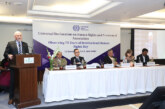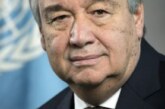WASHINGTON: In the summer, when heat waves scorch cities or heavy rains flood the coasts, some climate scientists and environmentalists will point out any plausible connections to global warming, hoping today’s weather will help people understand tomorrow’s danger from climate change.
 Then winter comes. And, like clockwork, those who want to deny the established science that humans are warming the planet will try to flip the script. In January, when large swaths of the country were gripped by bitter cold, President Donald Trump took to Twitter to mock climate fears: “Wouldn’t be bad to have a little of that good old fashioned global warming right now!”
Then winter comes. And, like clockwork, those who want to deny the established science that humans are warming the planet will try to flip the script. In January, when large swaths of the country were gripped by bitter cold, President Donald Trump took to Twitter to mock climate fears: “Wouldn’t be bad to have a little of that good old fashioned global warming right now!”
Welcome to the weather wars. As battle lines harden between supporters and opponents of climate action, both are increasingly using bouts of extreme weather as a weapon to try to win people to their side. But, as Trump’s words show, it’s also a framing device that can be easily abused. That raises the stakes for how scientists, who have long tried to distinguish between short-term weather fluctuations and long-term climate shifts, draw out and discuss the links between the two.
In recent years, some climate scientists have focused on trying to turn flare-ups of severe weather into teachable moments. “This is what global warming looks like,” scientists said during the summer of 2012, a season of widespread droughts, wildfires and extreme heat advisories.
Back in 2005, after Hurricane Katrina devastated New Orleans, many researchers responded cautiously, saying it was difficult to attribute a single event to global warming. A few noted that rising ocean temperatures could make hurricanes more destructive, on average, in the future. But even that was fairly abstract.
Over time, that messaging has shifted. Partly that’s because, as climate models have improved, scientists have been able to demonstrate more rigorously how rising greenhouse-gas emissions have made recent heat waves or droughts more intense or more likely to occur — a budding field known as “extreme weather attribution.” That strategy, though, can cut both ways. Deniers of climate change have also sought to use the daily weather to shape perceptions. Sen. James Inhofe, R-Okla., once brought a snowball to the Senate floor to suggest that global warming wasn’t a problem. When cold spells strike, Trump will ridicule worries about climate change.
Parrying Trump’s tweets can be a challenge, some supporters of action on climate change concede. He can drive the conversation: One recent survey from Media Matters, a liberal watchdog group, found that broadcast television networks rarely discuss global warming when extreme weather is unfolding. But they do often note the president’s climate comments.
“I see Trump’s tweets as an opportunity to discuss the science,” said Marshall Shepherd, a professor of atmospheric science at the University of Georgia. That raises the question of whether the messaging skirmishes around severe weather and climate change are swaying public perceptions, or whether each side is just preaching to those who are already converted.
There are some signs opinion is shifting. One possible explanation, the researchers suggested, was the spate of extreme weather disasters in 2018, from wildfires to hurricanes, along with increased efforts by scientists and even local TV weathercasters to put that in a climate context.
By Brad Plumer|NYT News Service



